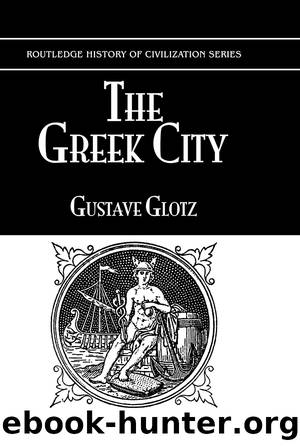The Greek City 7 Its Institutions by Glotz

Author:Glotz [Glotz]
Language: eng
Format: epub
Tags: History, Ancient, General, Social Science, Regional Studies
ISBN: 9781317845904
Google: Ee5kAgAAQBAJ
Publisher: Routledge
Published: 2013-12-19T17:11:34+00:00
Chapter V
The Magistrates
I
DEMOCRACY AND ITS MAGISTRATES
EVEN with the aid of its permanent Council the people could only secure the execution of its orders by delegating a portion of its sovereignty to certain magistrates. It was thus led to distinguish among the public offices magistracies properly so called, of a governmental or political nature (á¼ÏÏαί), and purely administrative functions (á¼Ïιµελείαι), without counting the minor offices (á½ÏηÏεÏίαι) which might be given to metics and slaves as well as to citizens.
By virtue of this delegation of sovereignty the great magistrates possessed, within their several spheres, the following powers:1 (1) The right of acting on their own initiative in accordance with the laws which qualified them, or of consulting the Assembly or the Council with regard to new decisions (Î²Î¿Ï Î»ÎµÏÏαÏθαι); (2) the fundamental right of giving orders and of passing obligatory measures (á¼ÏιÏάξαι), which implied the right of punishing the delinquent (á¼ÏÎ¹Î²Î¿Î»á½°Ï á¼Ïιβάλλειν) by the imposition of a fine whose maximum varied, according to the magistrature, from fifty to five hundred drachmas, or else of sending him before the courts for severer punishment;2 (3) judical competence in specified cases (κÏá¿Î½Î±Î¹), a competence which no longer carried the right of decision, but only that of receiving pleas, of making investigation and of presiding over the tribunal (ἡγεµονία).
Since the power of the magistrates emanated from popular sovereignty, democratic principle demanded that every citizen should be able to exercise it. But one must not apply to this precept the hackneyed interpretation which there is a temptation to give to it to-day. It did not merely signify that everyone had the right to attain to the exercise of the highest public functions; it proclaimed that everyone ought to attain to it as far as possible. âThe first characteristic of liberty,â says Aristotle, âis that all should command each and each in his turn allâ (Ïὸ á¼Î½ µá¼Ïει á¼ÏÏεÏθαι καὶ á¼ÏÏειν).3 It is also, according to the author of the Menexenus, the first condition of equality; for âamong brothers born of a common mother, there are neither slaves nor masters.â4 The result is that in a democracy, âno one is compelled to obey unless he may in his turn command: thus liberty and equality are combined.â5 No citizen, therefore, was excluded from honours, whatever his birth or fortune; such was actual fact. The only superiority which might be recognized was that of merit and ability, with the result that the republic would be governed by an aristocracy with the assent of the people: such was the ideal.6
In order to accelerate the alternating movement which was to bring citizens to offices of State and then send them back into the ordinary ranks, magistracies were of short duration. Most of them were annual. As a general rule citizens were forbidden to exercise the same function in several successive years or to hold more than one in the same year.7 These two rules were, however, capable of exceptions. A man might sit for two years in the Council, while with military offices, especially with that of the strategos, power might be renewed from year to year indefinitely.
Download
This site does not store any files on its server. We only index and link to content provided by other sites. Please contact the content providers to delete copyright contents if any and email us, we'll remove relevant links or contents immediately.
The European Opportunity by Felipe Fernández-Armesto(569)
The European History Highway: A Guide to Internet Resources by Dennis A. Trinkle Scott A. Merriman(534)
Morgan Kaufmann Digital Watermarking and Steganography by Ingemar Cox Matthew Miller Jeffrey Bloom Jessica Fridrich Ton(528)
The Seven Wonders of the Ancient World by Michael Denis Higgins(518)
Hyperculture by Byung-Chul Han(504)
European Security in a Global Context by Thierry Tardy(504)
European Security without the Soviet Union by Stuart Croft Phil Williams(501)
The Routledge companion to Christian ethics by D. Stephen Long Rebekah L. Miles(496)
Get Real with Storytime by Julie Dietzel-Glair & Marianne Crandall Follis(443)
Hudud Al-'Alam 'The Regions of the World' - a Persian Geography 372 A.H. (982 AD) by V. V. Minorsky & C. E. Bosworth(436)
Gorbachev And His Generals by William C. Green(427)
Tibetan Studies in Comparative Perspective by Chih-yu Shih Yu-Wen Chen(427)
Governance, Growth and Global Leadership by Espen Moe(417)
How Languages Are Learned 5th Edition by Patsy M Lightbown;Nina Spada; & Nina Spada(406)
CliffsNotes on Fitzgerald's The Great Gatsby by Kate Maurer(398)
The Oxford History of the World by Fernández-Armesto Felipe;(388)
The Egyptian Economy, 1952-2000 by Khalid Ikram(376)
Oral Poetry and Narratives from Central Arabia: The Poetry of Ad-Dindan : A Bedouin Bard in Southern Najd (Studies in Arabic Literature, Vol 17) (English and Arabic Edition) by P. M. Kupershoek P. Marcel Kurpershoek(365)
The Oxford Handbook of the Incas by Sonia Alconini(364)
